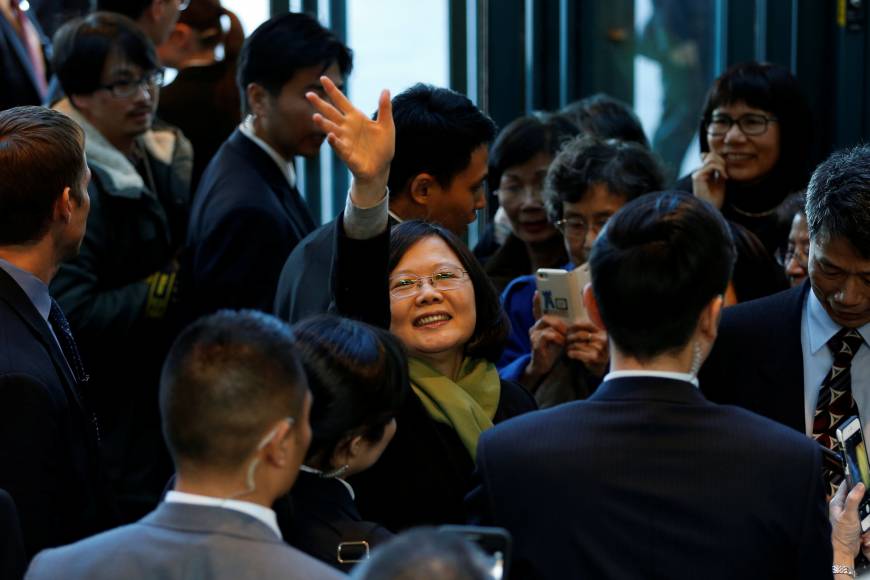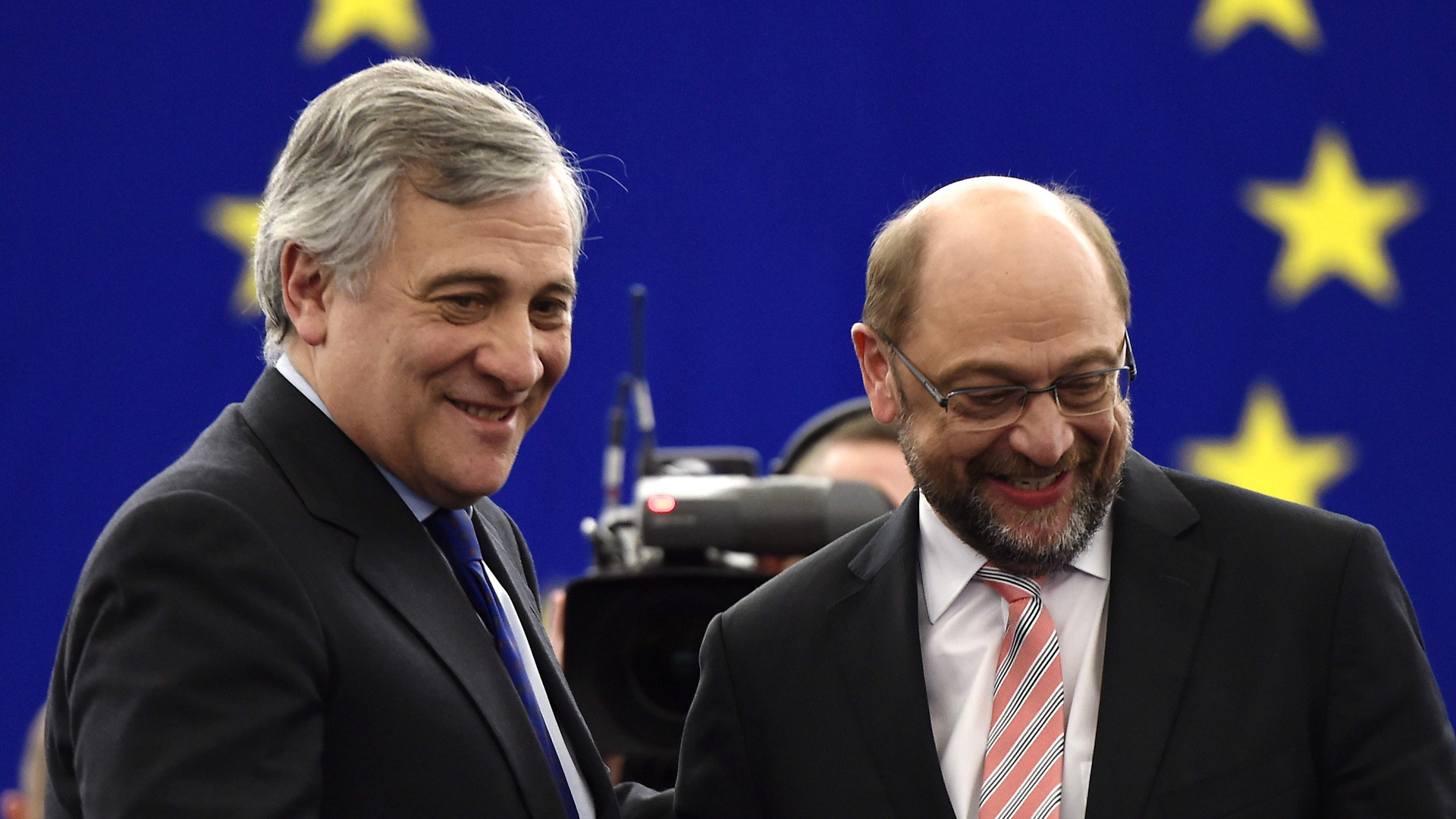 BEIJING/TAIPEI – A former premier will represent Taiwan at Donald Trump’s inauguration Friday, a visit likely to be closely scrutinized by China for signs the incoming president intends to make good on remarks suggesting a shake-up in relations between Taipei, Washington and Beijing.
BEIJING/TAIPEI – A former premier will represent Taiwan at Donald Trump’s inauguration Friday, a visit likely to be closely scrutinized by China for signs the incoming president intends to make good on remarks suggesting a shake-up in relations between Taipei, Washington and Beijing.
Yu Shyi-kun will be joined by lawmakers and local government officials representing both the ruling Democratic Progressive Party and the opposition Kuomintang, the Foreign Ministry announced. It said the delegation, which intends to “express the importance our government and people place on close friendly bilateral relations,” left Monday.
Along with attending the inauguration, the delegation will hold talks with politicians, academics and overseas Chinese community representatives, the ministry said in a statement on its website.
“Taiwan-U. S. relations have a lengthy history and have made significant progress in recent years,” the statement said. Congratulating Trump on his election, it said the government would “continue to strengthen Taiwan-U. S. relations in future on the basis of excellent mutual trust and interaction.”
The U. S. has no formal relations with Taipei in deference to China, which claims the island as its own. However, the two maintain robust informal ties, while Washington sells Taiwan arms and is legally bound to regard any threat to the island as a matter of grave concern.
Trump upset decades of diplomatic precedent by talking by phone with Taiwanese President Tsai Ing-wen shortly after his victory in November’s presidential election. Last week, he said in a newspaper interview that Washington’s “one-China” policy under which it recognized Beijing in 1979 was open to negotiation, and had earlier questioned why the U. S. should be bound by such an approach without China offering incentives.
On Monday, China’s Foreign Ministry said the one-China principle regarding Taiwan is not negotiable and any attempt to reconsider the issue would be self-defeating.
“Not everything in the world can be bargained or traded off,” Ministry spokeswoman Hua Chunying told reporters.
China threatens to use force to assert control over Taiwan and tensions across the Taiwan Strait have risen since Tsai’s election last year. Beijing has cut off contacts with her government and is using its diplomatic clout to further isolate the island.
Yu served as premier under former President Chen Shui-bian, who was despised by Beijing for his defiantly pro-independence stance.
Also Tuesday, Taiwan began two days of military drills simulating an attack by China as the government sought to reassure the public in the face of the deteriorating ties with Beijing.
The island’s armed forces gathered in central Taiwan for annual drills that saw troops practice combat skills with tanks, attack helicopters and artillery.
“The military has active measures to deal with the situation in the Taiwan Strait and the South China Sea so the public can rest assured. We will enhance training 365 days a year,” defense spokesman Chen Chung-chi said.
China has stepped up drills in recent weeks after being angered by the unprecedented Tsai-Trump call.
Tuesday’s drill mimicked an attack by China in a scenario where its war vessels have crossed over the middle line of the Taiwan Strait.
Soldiers held positions next to a U. S.-made Avenger air-defense missile system during the drill in central Taichung as special forces moved in formation through woods and a tank set off smoke bombs and crushed a car.
It comes after Beijing’s only aircraft carrier sailed through the strait last week in what was seen as a show of strength.
The Liaoning did not enter Taiwanese waters but went into an area covered by its air defense zone.
Chinese military aircraft also passed near Taiwan on Dec. 10 for the second time in less than a month.
In addition to the drills, the air force confirmed Tuesday an upgrade of Taiwan’s 143 F-16s was underway, with materials supplied by U. S. aerospace company Lockheed Martin, which manufactured the jets.
“Taiwan is the first country in the world to upgrade the F-16 A/B fighters to F-16 V. We are enhancing our aerial capabilities to ensure national security,” an air force official said.
The government-funded project, code named “Phoenix Rising” has a budget of 110 billion New Taiwan dollars ($3.47 billion) and aims to be complete within the next six years.
Defense Minister Feng Shih-kuan has said the F-16 V could match China’s Chengdu J-20 stealth fighter, although Chinese media have dismissed this as an “illusion.”
The jets will be equipped with radar to detect stealth aircraft, as well as more advanced avionics and missiles, according to local media.
Feng recently warned of growing threats from China and called for increased vigilance, urging the island’s youth to join the military.
© Source: http://www.japantimes.co.jp/news/2017/01/17/asia-pacific/politics-diplomacy-asia-pacific/taiwan-ex-premier-attend-trump-inauguration-amid-questions-one-china-policy/
All rights are reserved and belongs to a source media.
 Zuo Chunhe also mocked China for attempting to boycott Western values, Chinese media outlet Global Times reported.
Zuo Chunhe also mocked China for attempting to boycott Western values, Chinese media outlet Global Times reported. 

 BEIJING/TAIPEI – A former premier will represent Taiwan at Donald Trump’s inauguration Friday, a visit likely to be closely scrutinized by China for signs the incoming president intends to make good on remarks suggesting a shake-up in relations between Taipei, Washington and Beijing.
BEIJING/TAIPEI – A former premier will represent Taiwan at Donald Trump’s inauguration Friday, a visit likely to be closely scrutinized by China for signs the incoming president intends to make good on remarks suggesting a shake-up in relations between Taipei, Washington and Beijing. 
 CANBERRA, Australia—The nearly three-year search to resolve one of history’s biggest aviation mysteries ended on Tuesday the same way it began: with the barest of clues over what happened to missing Malaysia Airlines Flight 370.
CANBERRA, Australia—The nearly three-year search to resolve one of history’s biggest aviation mysteries ended on Tuesday the same way it began: with the barest of clues over what happened to missing Malaysia Airlines Flight 370. 
 Nutzungsbedingungen Embedding Tagesschau: Durch Anklicken des Punktes „Einverstanden“ erkennt der Nutzer die vorliegenden AGB an. Damit wird dem Nutzer die Möglichkeit eingeräumt, unentgeltlich und nicht-exklusiv die Nutzung des tagesschau.de Video Players zum Embedding im eigenen Angebot. Der Nutzer erkennt ausdrücklich die freie redaktionelle Verantwortung für die bereitgestellten Inhalte der Tagesschau an und wird diese daher unverändert und in voller Länge nur im Rahmen der beantragten Nutzung verwenden. Der Nutzer darf insbesondere das Logo des NDR und der Tageschau im NDR Video Player nicht verändern. Darüber hinaus bedarf die Nutzung von Logos, Marken oder sonstigen Zeichen des NDR der vorherigen Zustimmung durch den NDR.
Nutzungsbedingungen Embedding Tagesschau: Durch Anklicken des Punktes „Einverstanden“ erkennt der Nutzer die vorliegenden AGB an. Damit wird dem Nutzer die Möglichkeit eingeräumt, unentgeltlich und nicht-exklusiv die Nutzung des tagesschau.de Video Players zum Embedding im eigenen Angebot. Der Nutzer erkennt ausdrücklich die freie redaktionelle Verantwortung für die bereitgestellten Inhalte der Tagesschau an und wird diese daher unverändert und in voller Länge nur im Rahmen der beantragten Nutzung verwenden. Der Nutzer darf insbesondere das Logo des NDR und der Tageschau im NDR Video Player nicht verändern. Darüber hinaus bedarf die Nutzung von Logos, Marken oder sonstigen Zeichen des NDR der vorherigen Zustimmung durch den NDR.
 Die deutsche Handball-Nationalmannschaft hat die nächste Hürde in der WM-Vorrunde gemeistert: Durch den klaren 38:24-Sieg gegen Saudi-Arabien erreicht der Europameister vorzeitig die K.o.-Runde.
Die deutsche Handball-Nationalmannschaft hat die nächste Hürde in der WM-Vorrunde gemeistert: Durch den klaren 38:24-Sieg gegen Saudi-Arabien erreicht der Europameister vorzeitig die K.o.-Runde.
 Paris/Abuja (dpa) – Ein nigerianisches Kampfflugzeug hat versehentlich ein Flüchtlingslager bombardiert und dabei mindestens 52 Menschen getötet. In dem Lager in Rann nahe der Stadt Maiduguri seien bei dem Angriff zudem 120 Menschen verletzt worden, erklärte die Hilfsorganisation Ärzte ohne Grenzen (MSF).
Paris/Abuja (dpa) – Ein nigerianisches Kampfflugzeug hat versehentlich ein Flüchtlingslager bombardiert und dabei mindestens 52 Menschen getötet. In dem Lager in Rann nahe der Stadt Maiduguri seien bei dem Angriff zudem 120 Menschen verletzt worden, erklärte die Hilfsorganisation Ärzte ohne Grenzen (MSF). 
 Rouen (dpa) – Nach dem Spaziergang der deutschen Handballer ins WM-Achtelfinale hakte Dagur Sigurdsson den Pflichtsieg gegen Saudi-Arabien trotz einer teilweise schlampigen Abwehrleistung seiner Bad Boys schnell ab.
Rouen (dpa) – Nach dem Spaziergang der deutschen Handballer ins WM-Achtelfinale hakte Dagur Sigurdsson den Pflichtsieg gegen Saudi-Arabien trotz einer teilweise schlampigen Abwehrleistung seiner Bad Boys schnell ab. 
 Der ehemalige EU-Industriekommissar Antonio Tajani wird nach Angaben von Abgeordneten Nachfolger von Martin Schulz als Präsident des Europäischen Parlaments. Der 63-jährige Italiener habe in der Stichwahl mit 351 Stimmen die erforderliche Mehrheit erreicht, hieß es von mehreren Abgeordneten am Dienstagabend nach dem vierten Wahlgang in Straßburg.
Der ehemalige EU-Industriekommissar Antonio Tajani wird nach Angaben von Abgeordneten Nachfolger von Martin Schulz als Präsident des Europäischen Parlaments. Der 63-jährige Italiener habe in der Stichwahl mit 351 Stimmen die erforderliche Mehrheit erreicht, hieß es von mehreren Abgeordneten am Dienstagabend nach dem vierten Wahlgang in Straßburg. 
 Der italienische Konservative Tajani ist zum neuen EU-Parlamentspräsident gewählt worden. Erst im vierten Wahlgang setzte er sich mit 351 zu 282 Stimmen gege n den Sozialdemokraten Pittella durch.
Der italienische Konservative Tajani ist zum neuen EU-Parlamentspräsident gewählt worden. Erst im vierten Wahlgang setzte er sich mit 351 zu 282 Stimmen gege n den Sozialdemokraten Pittella durch.
 TOKYO – A family of four believed to be from Australia has been rescued safely after getting lost at a ski resort in central Japan, where they survived the night reportedly inside a hole they dug in the snow.
TOKYO – A family of four believed to be from Australia has been rescued safely after getting lost at a ski resort in central Japan, where they survived the night reportedly inside a hole they dug in the snow. 

